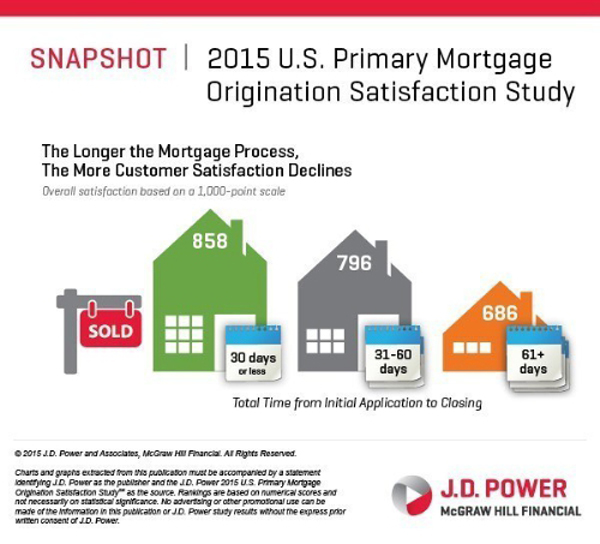New mortgage tech raises satisfaction
But potential TRID delays demand communication up front—and especially digitally, for millennials
- |
- Written by Website Staff

Overall mortgage customer satisfaction has increased this year as lenders have focused on developing functional digital channels and improving operational efficiency, according to research by J.D. Power.
Despite this overall increase in satisfaction, mortgage lenders are under increased pressure from new loan disclosure regulations that could increase the time it takes to get a home loan, the researchers found. In addition, traditional mortgage lenders face increased competition from nontraditional sources.
How mortgage lenders have performed
The study measures customer satisfaction with the mortgage origination experience in six factors (listed in alphabetical order): application/approval process; interaction; loan closing; loan offerings; onboarding; and problem resolution. Satisfaction is calculated on a 1,000-point scale.
Overall customer satisfaction with mortgage origination averages 793 in 2015, an increase of 7 points from 2014. The increase in satisfaction was driven by a 22-point gain in the application and approval process factor, influenced by improved perceptions of the speed of the loan process. When loans close earlier than promised, satisfaction is significantly higher (866), compared to when loans close as expected (821) and when it takes longer than expected (658).
The study also found that overall satisfaction with several mortgage application-related activities, such as completing an application (799); submitting documents (804); and receiving status updates (811) is markedly higher among customers who used digital communication channels versus those who communicated via mail and fax (753, 766, and 770, respectively).
The links between the perception of mortgage processing speed and efficiency and overall customer satisfaction are particularly noteworthy in light of new TRID (TILA RESPA Integrated Disclosure), a.k.a. "know before you owe" regulation, which went into effect in October.
This law has the potential to increase the mortgage timeline. Delays could pose a significant challenge for lenders when serving home buyers across all generations, but they could be particularly challenging when dealing with millennials (ages 18-34) who are technically savvy, always connected to the internet, and noted as being capricious consumers.
"While a lot of effort has been placed on ensuring compliance with new regulations, it is imperative that lenders improve their education and communication about the impact of these changes or risk losing customers," warns Craig Martin, director of the mortgage practice at J.D. Power. "Effective communication remains one of the most important aspects of a satisfying mortgage experience, especially if the process is taking longer than it has historically.”
What of the impatient millennials, then?
“As the number of millennial home buyers continues to rise, lenders must be ready to meet their expectations,” Martin says. “This generation is highly digitally connected, so ongoing communication and transparency via the channels they prefer, particularly mobile, are vital."

Build business by earning good customer voice
Overall, the survey found that providing an outstanding mortgage origination experience can generate high levels of advocacy and retention.
Researchers found that 71% of highly satisfied customers (overall satisfaction scores of 900 or higher) say they "definitely will" recommend their lender, and 76% say they "definitely will" consider reusing the same lender for their next home purchase.
In comparison, only 5% of dissatisfied customers (scores of 699 or less) say they "definitely will" recommend and 8% say they "definitely will" consider reusing the lender.
Tips from survey results
Following are some of the key findings in this year's study that have practical application potential:
• Communication throughout the loan process mitigates dissatisfaction with a longer timeline.
When the loan process takes more than two months, satisfaction is 686. However, when an accurate time frame estimate and proactive updates are provided in that same scenario, satisfaction is 859.
• Educate millennial applicants in process and choices.
With millennials now accounting for the largest share of loan originations over the last two years, J.D. Power reported that nearly four in ten (37%) millennial customers indicate that the origination process was not completely explained to them, and 58% indicate their options, terms, and fees were not completely explained.
• Have staff reach to customers to keep them happy.
Those loan representatives who engage customers, build trust, and ensure that borrowers understand each step of the process can mitigate the negative impact on satisfaction due to missing closing dates (764 missed date/effective representative vs. 511 missed date/ineffective representative).
• Keep the process moving.
The percentage of applications and approvals that close earlier than promised has increased to 35% in 2015 from 31% in 2014.
Related items
- Wall Street Looks at Big Bank Earnings, but Regional Banks Tell the Story
- Economists Become More Optimistic About Credit Conditions
- JP Morgan Drops Almost 5% After Disappointing Wall Street
- Banks Compromise NetZero Goals with Livestock Financing
- Financial Optimism Rises Among Middle Income Households













